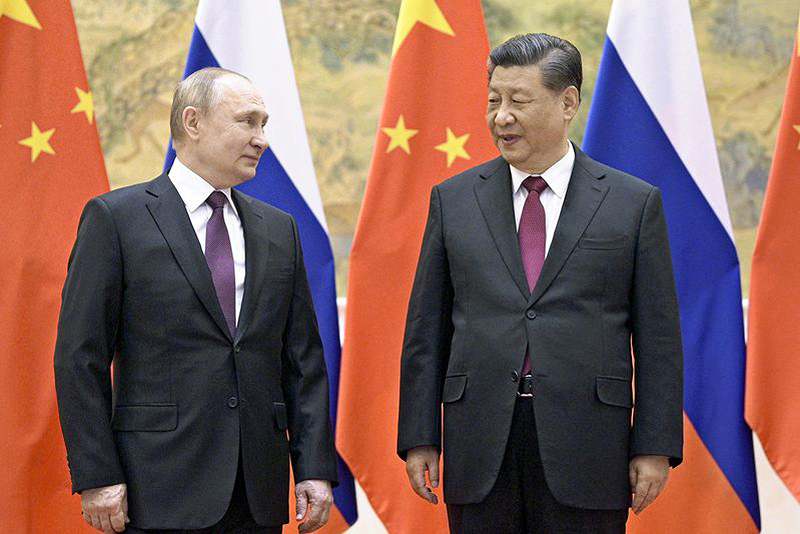
Chinese President Xi Jinping and Russian President Vladimir Putin talk during their meeting in Beijing on Feb. 4.
10:33 JST, March 12, 2022
BEIJING — China is expanding trade with Russia, which is invading Ukraine. Possibilities are high that Beijing is continuing to indirectly support Moscow on the economic front as China opposes sanctions against Russia by the United States, European nations, Japan and other countries.
But the move is a double-edged sword as Beijing’s excessive inclination toward Moscow, being isolated in the international community, could make China’s position even more difficult in the international community.
38.5% increase
According to trade statistics released by China’s customs authorities for the January-February period, total trade with Russia increased 38.5% from the same period last year. According to Chinese media reports, the growth rate was the highest in 12 years and far exceeded the 15.9% growth in China’s total trade.
Details by type of product have not been disclosed, but China is believed to have increased imports of items such as crude oil and natural gas from Russia. China also likely increased exports of products such as machinery to its neighbor.
China is Russia’s largest trading partner, and such increased transactions will provide significant economic support to Moscow as global moves to isolate Russia are gaining momentum.
In conjunction with the summit between Chinese President Xi Jinping and Russian President Vladimir Putin on Feb. 4, China announced that it would purchase an additional 10 billion cubic meters of natural gas per year from Russia. On Feb. 24, when Russian troops invaded Ukraine, Beijing lifted restrictions on the import of Russian wheat, which had been limited due to phytosanitary concerns.
Trade between China and Russia has increased by more than 50% since Russia annexed Crimea in 2014.
“No matter how precarious and challenging the international situation may be,” China’s State Councilor and Foreign Minister Wang Yi said during a March 7 press conference, “China and Russia will maintain strategic focus and steadily advance our comprehensive strategic partnership of coordination for a new era.”
Taking advantage
China has provided economic support to North Korea and Iran, among other nations, that have been sanctioned by Western nations.
According to Reuters, China’s purchases of Iranian crude oil rose to a record high in January, with estimated imports exceeding 700,000 barrels per day. China is said to have been attracted to Iranian oil as it is undervalued under sanctions. Bloomberg News reported that, according to sources, Chinese companies will buy Russian crude oil at low prices as other buyers are not available because of the U.S. and European sanctions.
Russian products have also been bought online in China.
An official Russian e-commerce store on the website of online shopping giant JD.com, Inc. was flooded with orders. Products such as chocolate and vodka sold out or reservations needed to be made to purchase items.
Catching flak
An overly pro-Russian stance can pose a risk to China.
In an emergency session of the U.N. General Assembly on March 2, 141 of the 193 member states voted for the resolution demanding that Russia immediately end its military operations in Ukraine, with China among 35 states that abstained.
By continuing economic support to Russia, which is under fire from the international community, China could also catch some flak. China’s relations with emerging and developing nations, which have been built over the years through infrastructure construction and the provision of COVID-19 vaccines, may also be affected.
An economic blow is also expected. China is the world’s largest importer of resources, and soaring prices for crude oil and other commodities will be a burden on businesses and households.
Lian Weiliang, vice chairman of the National Development and Reform Commission, which oversees China’s economic policies, could not hide his sense of crisis as he spoke at a press conference on March 7, saying China will definitely be affected by the price increases.
If the global economy deteriorates, China’s export-heavy industry will also be adversely affected.
Top Articles in World
-

China Confirmed to Be Operating Drilling Vessel Near Japan-China Median Line
-

China Eyes Rare Earth Foothold in Malaysia to Maintain Dominance, Counter Japan, U.S.
-

Japan, Qatar Ministers Agree on Need for Stable Energy Supplies; Motegi, Qatari Prime Minister Al-Thani Affirm Commitment to Cooperation
-

North Korea Possibly Launches Ballistic Missile
-

10 Universities in Japan, South Korea, Mongolia to Establish Academic Community to Promote ICC Activities, Rule of Law
JN ACCESS RANKING
-

Univ. in Japan, Tokyo-Based Startup to Develop Satellite for Disaster Prevention Measures, Bears
-

JAL, ANA Cancel Flights During 3-day Holiday Weekend due to Blizzard
-

China Confirmed to Be Operating Drilling Vessel Near Japan-China Median Line
-

China Eyes Rare Earth Foothold in Malaysia to Maintain Dominance, Counter Japan, U.S.
-

Japan Institute to Use Domestic Commercial Optical Lattice Clock to Set Japan Standard Time





















